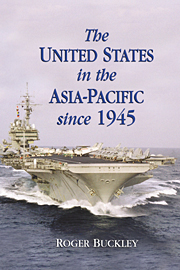Book contents
- Frontmatter
- Contents
- List of Maps
- Preface
- Abbreviations
- Introduction
- 1 Postwar: Asia-Pacific, 1945–1950
- 2 War: Korea, 1950–1953
- 3 Postwar: Asia-Pacific, 1953–1960
- 4 War: Vietnam, 1960–1975
- 5 Postwar: Asia-Pacific, 1975–1989
- 6 Post-Cold War: Asia-Pacific, 1989–2000
- 7 Future: Asia-Pacific, 2001–2020
- 8 Conclusions
- Select Bibliography
- Index
5 - Postwar: Asia-Pacific, 1975–1989
Published online by Cambridge University Press: 06 January 2010
- Frontmatter
- Contents
- List of Maps
- Preface
- Abbreviations
- Introduction
- 1 Postwar: Asia-Pacific, 1945–1950
- 2 War: Korea, 1950–1953
- 3 Postwar: Asia-Pacific, 1953–1960
- 4 War: Vietnam, 1960–1975
- 5 Postwar: Asia-Pacific, 1975–1989
- 6 Post-Cold War: Asia-Pacific, 1989–2000
- 7 Future: Asia-Pacific, 2001–2020
- 8 Conclusions
- Select Bibliography
- Index
Summary
China is outgrowing Asia and trying the world on for size.
Steven I. Levine, China's Foreign Relations in the 1980s (New Haven, 1984)As long as Japan remains a merchant-cum-industrialist, we must always defer to the United States. We have to swallow our pride, accept insults and not argue back. Otherwise, we may lose the American market.
If that is too high a price to pay, we have to raise our sights and become a leader. We would need our own ideology, independent defense and economic policies, and leaders who can perform on the world stage.
Amaya Naohira, Tokyo Shimbun, 24 June 1987The United States' humiliation in Vietnam coincided with major alterations to the bipolar world that had existed since 1945. While the Cold War certainly continued throughout the 1970s and, indeed, 1980s, there were changes to the fundamental structure of international relations that led to an enlarged and thereby more complex international system. By the early 1970s the manner in which the United States and the Soviet Union had jointly organized and run the world underwent novel and important shifts. President Nixon, for example, invoked the concept of a new world order. He identified five power centres: those, naturally, of the United States and the Soviet Union but with the addition of the European Community, the People's Republic of China, and Japan. There were, of course, large discrepancies in the relative political, military and economic power positions of all five such entities, but even to recognize these trends publicly within the world system is evidence of how the US government's thinking was evolving by the early 1970s.
- Type
- Chapter
- Information
- The United States in the Asia-Pacific since 1945 , pp. 153 - 180Publisher: Cambridge University PressPrint publication year: 2002



